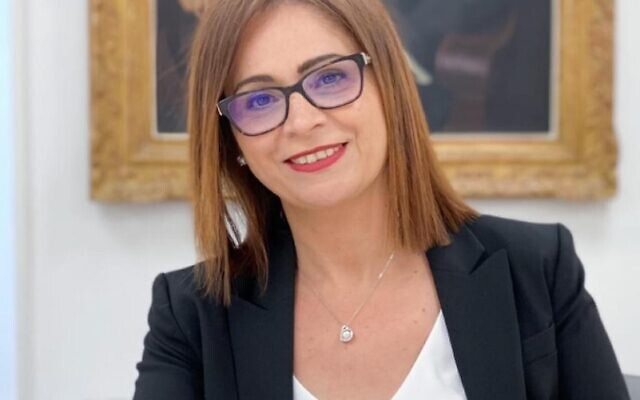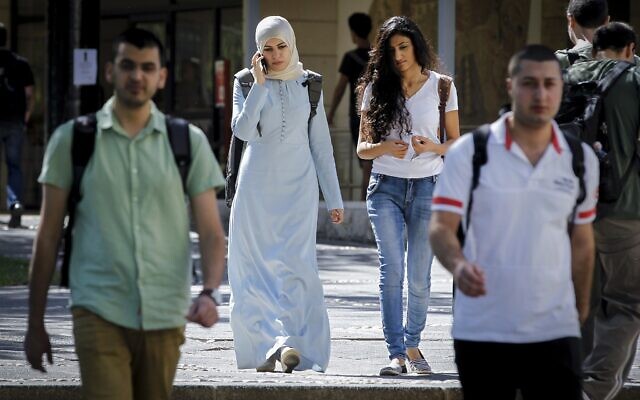The Israeli university that wants to draw Jews, Arabs and Ethiopians closer together
More Arab-Israelis are calling themselves Palestinians and that is a sign they feel more secure as Israeli citizens, says Hebrew University's Mona Khoury-Kassabri
Michael Daventry is Jewish News’s foreign and broadcast editor
Few would argue Israel is not a demographically diverse country.
Gone are the days when one of two camps, Jewish or Arab, was considered enough to determine what kind of an Israeli citizen you are.
These days the phrase is “cultural kaleidoscope”, although a bit of a cliché, is more appropriate to explain how this is a country that is home to a mix of ethnicities and cultures.
Fitting, then, that the first Arab woman appointed to a senior role at one of Israel’s largest universities is responsible for making sure the most overlooked sections of society are better represented.
Mona Khoury-Kassabri, vice president of strategy and diversity at Hebrew University, specialises in social welfare issues — areas such as school violence and bullying both in person and online — and her studies have taken her from hometown of Haifa, in the north of Israel, to Toronto and Chicago.
She told Jewish News that her role is about more than simply getting as many students from minority backgrounds through the university’s doors: “There is a saying: ‘diversity is being invited to the party; inclusion is being invited to dance in the party.’
“We have a lot of under-represented groups, such as the Arabs, ultra-Orthodox, Ethiopian students; students who are the first generation in higher education; students with disabilities.
“So we have a challenge in opening our doors to all these groups but when they come, it is not enough. You can’t just bring these groups and say, ‘now you’re equal’.
“In this case, equality isn’t the solution because we know they’re different and we know that they have more challenges than others, so bringing them in an equal basis is actually making the situation worse.”

The solution, Khoury-Kassabri said, is supporting students to make sure they spent time studying and socialising together once they are admitted.
“We know that this is the first time different groups in Israeli society meet. Before this [in secondary schools], Arab students study separately, ultra-Orthodox study separately, even Jewish students … mostly study in separate schools.”
That is why there are interfaith groups where Jews, Muslims and Christians meet and events where students come together to talk about things other than religion. There are spaces too where Arabs help Jewish students with their Arabic assignments, and Jews reciprocate by helping to brush up their Hebrew.
The objective, Khoury-Kassabri added, is to change perceptions and demonstrate that other institutions, whole cities even, can find ways of living more harmoniously alongside each other.
She appeared to exude optimism about the younger generation in this region and draws heart from the fact that some studies suggest more and more Israeli Arabs are now preferring to call themselves “Palestinians in Israel”.
“I think in many cases, students and families were not feeling secure to say that and now it’s more acceptable,” she said.
“People understand that saying ‘we belong to the Palestinian nation but we are Israeli, we live in Israel, we have Israeli citizenship’, it doesn’t mean that we hate the country, we want to leave the country, we want to destroy the country.”
“No,” she said, shaking her head during our conversation our Zoom.
What Arab Israelis and other marginalised groups in the country want is equality: “We are fortunate that in a university to give the opportunity to give students the feeling that they belong and try to expand the ways they can feel equal and not discriminated.
“What we are trying to do, at least at our university, all our efforts are so that these groups feel that the university belongs to all of us.”

Thank you for helping to make Jewish News the leading source of news and opinion for the UK Jewish community. Today we're asking for your invaluable help to continue putting our community first in everything we do.
For as little as £5 a month you can help sustain the vital work we do in celebrating and standing up for Jewish life in Britain.
Jewish News holds our community together and keeps us connected. Like a synagogue, it’s where people turn to feel part of something bigger. It also proudly shows the rest of Britain the vibrancy and rich culture of modern Jewish life.
You can make a quick and easy one-off or monthly contribution of £5, £10, £20 or any other sum you’re comfortable with.
100% of your donation will help us continue celebrating our community, in all its dynamic diversity...
Engaging
Being a community platform means so much more than producing a newspaper and website. One of our proudest roles is media partnering with our invaluable charities to amplify the outstanding work they do to help us all.
Celebrating
There’s no shortage of oys in the world but Jewish News takes every opportunity to celebrate the joys too, through projects like Night of Heroes, 40 Under 40 and other compelling countdowns that make the community kvell with pride.
Pioneering
In the first collaboration between media outlets from different faiths, Jewish News worked with British Muslim TV and Church Times to produce a list of young activists leading the way on interfaith understanding.
Campaigning
Royal Mail issued a stamp honouring Holocaust hero Sir Nicholas Winton after a Jewish News campaign attracted more than 100,000 backers. Jewish Newsalso produces special editions of the paper highlighting pressing issues including mental health and Holocaust remembrance.
Easy access
In an age when news is readily accessible, Jewish News provides high-quality content free online and offline, removing any financial barriers to connecting people.
Voice of our community to wider society
The Jewish News team regularly appears on TV, radio and on the pages of the national press to comment on stories about the Jewish community. Easy access to the paper on the streets of London also means Jewish News provides an invaluable window into the community for the country at large.
We hope you agree all this is worth preserving.






















